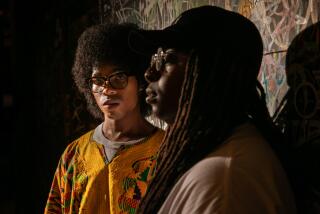South Africa’s Johnny Clegg: A Witness to History : Pop music: The singer loses a band member to violence even as his new album celebrates a brave new world. He starts a Southland tour Friday.
As the ‘90s opened, Johnny Clegg watched in awe at the radical changes in the world around him--the kind of changes politically active musicians like him often cry out for, but all too rarely witness in their lifetimes.
The British-born, South Africa-reared singer-songwriter touches on the feeling of viewing history in the making in “Your Time Will Come” from “Heat, Dust and Dreams,” the new album by Clegg and his band, Savuka:
I saw the Berlin Wall fall
And I saw Mandela walk free
I saw a dream whose time has come
change my history--so keep on dreaming
The stinging irony is that while Clegg was in the midst of recording that album, his friend and fellow band member Dudu Zulu was shot to death while trying to mediate a dispute between feuding South African clans.
Where all too often the wholesale brutality in the outside world forces the individual to take refuge in life’s small victories, Clegg found himself in the position of looking to global-scale political upheaval for a sense of balance in the wake of an intensely personal loss.
“It’s the pain of living: You get the beautiful moments, you get the painful moments,” Clegg said, a few days into Savuka’s first U.S. tour in three years, and its first without Dudu Zulu. That tour brings the group through the Southland for shows Friday at the Wiltern Theatre in Los Angeles, Saturday at the Ventura Theatre and Sunday at Solana Beach’s Belly Up Tavern.
Besides Dudu Zulu’s role as one of Savuka’s percussionists, he played a highly visible role as Clegg’s partner and foil in energetic Zulu dance numbers that climaxed each performance.
Clegg’s songs--some overtly, some metaphorically--frequently challenge any group that would deny equality to another.
*
He’s been phenomenally popular in South Africa--mostly through the band’s exuberant concerts, as radio has often refused to play their records--and in many European countries. But he has yet to have a certified hit in the United States--no charted singles and a peak at No. 123 on Billboard with the “Cruel, Crazy, Beautiful World” album.
Since he was 15, Clegg has been arrested numerous times for running afoul of laws aimed at keeping in place the wall separating South Africa’s ruling white minority and the country’s black majority.
His run-ins with the law mostly stemmed from going places whites weren’t supposed to go, doing things whites weren’t supposed to do.
“To me, they were fun things, things I wanted to be a part of: dancing with Africans at a migrant workers’ hostel, playing with them at night on the roofs where they live, and things I wasn’t allowed, because of the apartheid laws, to do,” Clegg said.
His own two bands--Juluka (Zulu for “sweat”) and then Savuka (“we have arisen”), which formed after Juluka broke up in 1985--have flouted the status quo with racially integrated lineups.
Clegg said he considered disbanding Savuka after Zulu’s death when he began to feel the band might be “cursed.” During the recording of Savuka’s previous album, “Cruel, Crazy, Beautiful World,” a professor and fellow anti-apartheid activist, David Webster, whom Clegg considered a friend and mentor, was assassinated in Johannesburg.
Ultimately, Clegg heeded his own words in “These Days,” from the new album:
Got to get up, got to move out
Face the tide beyond the door
Outside there’s a whole world changing
We can’t stand here, trapped inside.
More to Read
The biggest entertainment stories
Get our big stories about Hollywood, film, television, music, arts, culture and more right in your inbox as soon as they publish.
You may occasionally receive promotional content from the Los Angeles Times.









